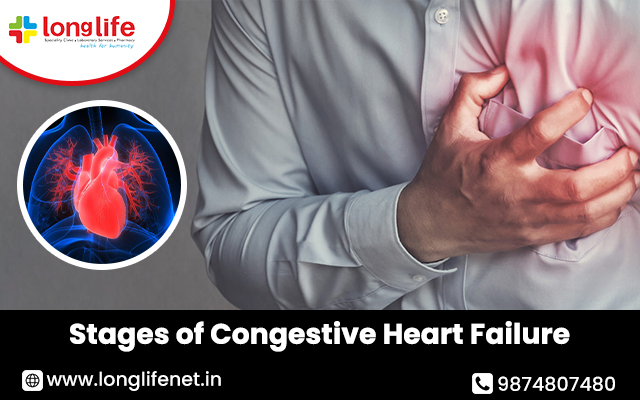Congestive heart failure is a deadly disease where the heart fails to pump enough blood to give the body sufficient supply. As a result, blood and fluids accumulate in various parts of the body, like the lungs and legs, over time. Here, the best heart specialists in Mukundapur have discussed the different stages of this life-threatening disease and ways to prevent it.
Causes
- Coronary artery disease
- Cardiomyopathy, a disease that affects the myocardium, the heart muscle
- Congenital heart disease
- Diabetes
- Hypertension or high blood pressure
- Arrhythmia or irregular heartbeat
- Kidney disease
- Obesity
Stages
Congestive heart failure is a serious condition that gradually progresses in four distinct stages, denoted as A, B, C, and D. The condition worsens with time. The best cardiac surgeons have explained the stages of heart failure below.
- Stage A: Also known as pre-heart failure phase, in this stage, individuals are at an increased risk of heart failure due to a family history of congestive heart failure or the presence of specific medical conditions like:
- Hypertension: Blood pressure is at 140/90 mmHg or higher
- Cardiomyopathy: A condition impacting the function of heart muscles
- Diabetes: Elevated blood glucose levels.
- Coronary Artery Disease: Plaque buildup in coronary arteries, a condition that hinders the supply of blood to the arteries
- History of rheumatic fever: An autoimmune condition that inflames the heart and joints.
- Stage B: The left ventricle of the human heart fails to function properly or gets structural damage in this stage. A person is likely to experience cardiac issues like ventricular remodelling and valvular abnormalities, both of which obstruct blood flow and need prompt medical attention.
- Stage C: At this stage, individuals may show signs of heart failure associated with pre-existing structural heart problems, such as experiencing fatigue or shortness of breath. These symptoms commonly arise from the pumping chamber of the left ventricle. Patients are diagnosed with congestive heart failure when the disease is in its third stage.
- Stage D: Also known as reduced Ejection Fraction, this stage indicates the heart’s failure to pump sufficient blood and causes fatigue, shortness of breathness, and irregular heartbeat. The patient experiences advanced symptoms that can no longer be treated. This is the last stage of heart failure.
Prevention
Doctors suggest that the most effective way to prevent this disease is by following these preventative methods:
- Quit smoking: Smoking causes serious arterial damage and hence increases the risk of heart failure. So, quit smoking.
- Have a nutritious diet: Eat plenty of vegetables and fruits, lean protein, low-fat dairy and good fats like the ones found in nuts, fish and olive oil. Foods high in trans fat or saturated fats must be avoided.
- Stay active: Doctors also advise overweight people to perform physical exercises regularly for optimal weight management.
Consult the best heart specialists and follow their instructions properly. Adherence to the treatment plan can significantly reduce your risk of developing congestive heart failure and make a huge difference in the long run.

